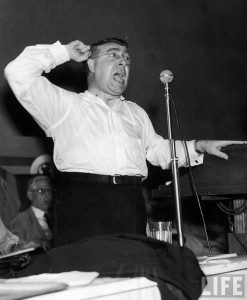I’m not sure whether Glenn Beck’s subject here is marriage equality or renewable energy or affordable health insurance for working people. Or maybe it’s about the fight to keep a 35-percent marginal tax rate on upper incomes from becoming a 37-percent marginal tax rate. In any case, here is what right-wing TV and radio loon Glenn Beck had to say:
I want my children and my grandchildren to be able to air this episode. I stood. I gave it my all. I did everything I could. Against all odds, I stood. In the face of an avalanche; against, quite honestly, systems that will become enemies of all humanity, I stood. I want my children and my grandchildren to be able to have my name and say “when all of the rest of your families did nothing, this is what my family did.”
It doesn’t matter if this was about Obamacare or eliminating food stamps or deporting immigrants — Beck talks like this about everything.

Beck is a fairly transparent liar. His real legacy for his children and his grandchildren won’t be their pride that he stood bravely against the “enemies of humanity.” It will be a big fat trust fund — invested in the kind of private, off-shore hedge funds his audience could never afford, and not in money-losing crap like those commemorative gold coins he’s always scaring the suckers into buying.
And as for how he made all that money, well, he’ll just have to hope that his children able to forgive him some day. He did it all for them, he’ll say. But they’ll know, and he’ll know, that’s a lie. He liked it. He was good at it. And he was really … he was alive.
But what about Beck’s audience? A percentage of them, apparently, are fearful and gullible enough to swallow this stuff completely. A small portion of his audience may be — and, I’m sorry, there’s no delicate way to put this — not very bright, and thus susceptible to believing what Beck says because an authoritative-sounding voice on the radio said it must be so.
But most of Beck’s audience isn’t that dim. And so most of Beck’s audience has to be mostly aware that this is a game of make-believe. Yes, it’s fun to pretend we’re just like Patrick Swayze in Red Dawn, because he was so cool and wouldn’t it be cool if we were that cool and that brave instead of the way we know ourselves to be, and wouldn’t it be great if we had Jennifer Grey and Lea Thompson looking at us like that, instead of the way …
But not-so-deep-down, they have to know it’s just a game. It’s just pretend. I don’t just mean a dim nagging at the edge of their self-awareness, I mean a pervasive, constant, gnawing ache. And the harder they play the game the more it backfires, highlighting the vast gulf between the pretend-self and the actual, unavoidable self.
For it to be otherwise — for them not to know this, not to know themselves — would require a depth of delusion I cannot comprehend.
Kevin Drum points us to a fascinating study of the appeal of what the researchers call “outrage-based radio and television programs.” That is, shows like Glenn Beck’s, which exist to manufacture and to fuel the sensation of outrage, and thus also, the chance to feel — if only by pretending — the kind of heroic pride imitated by that delirious Beck quote above.
Tom Jacobs discusses this study in a Pacific Standard piece, “What’s the Appeal of Angry, Polarized Media?”
Psychological research has generally pointed to our desire to avoid cognitive dissonance—that is, information that conflicts with our strongly held (and emotionally based) convictions. But in a recently published paper, a trio of Tufts University researchers led by sociologist Sarah Sobieraj provides an alternative analysis.
“The data suggests to us that outrage-based programming offers fans a satisfying political experience,” they write in the journal Poetics. “These venues offer flattering, reassuring environments that make audience members feel good. Fans experience them as safe havens from the tense exchanges that they associate with cross-cutting political talk they may encounter with neighbors, colleagues, and community members.”
Read Jacobs’ whole article for a fascinating look at one of the things Sobieraj et. al. found to be a primary desire for conservative fans of “outrage” media: a refuge from potentially being perceived as racist:
“The experience of being perceived as racist loomed large in the mind of conservative fans (we interviewed),” they report. Every single conservative respondent raised the issue of being called racist, and did so without even being asked.
Kevin finds this frustrating. The same research that provides mountains of evidence that racial animosity is driving much of this conservative outrage media also demonstrates that confronting — or even mentioning — such evident racial resentment tends to “drive people to the safe confines of friendly media, and help fuel the ongoing outrage machine.”
The same is true, I suspect, of the kind of discussion I offer above, about the fantasy game being played by the perpetually outraged. They’re pretending — and we know they’re pretending. And they know that we know they’re pretending. But to say so out loud tends only to push them further into pretense and into ever more elaborate and extreme fantasies of outrage.
“I wish there were some way to talk about it that didn’t instantly estrange conservatives even further — but that also didn’t water the truth down into mush,” Kevin writes. “I imagine I’ll be wishing for that for a very long time.”
The one little mustard seed of hope I take from all this comes from another finding from the researchers at Tufts:
Their content analysis found many examples of hosts who “offer social connections by building a sense of intimacy.” With their informal, conversational style, these media-savvy men and women create “what feels distinctly like a one-on-one relationship between the individual fan and the host.
“Whereas political conversation generates fear of social exclusion, outrage-based programs incorporate and even include viewers and listeners,” the researchers report. “The host presents as a kindred spirit who ‘gets you’ even when other folks do not.”
Discussing politics with your colleagues or neighbors comes with the fear of saying something unacceptable, and subsequently being excluded from the next barbecue or water-cooler conversation. In contrast, “the comfort zones provided by the shows we studied present no such risk,” Sobieraj and her colleagues write. “In fact, they offer imagined and, in some cases, tangible social connections.”
This is part of what I mean when I say that people like Glenn Beck aren’t telling lies to deceive their listeners, but rather are telling lies that invite listeners to participate in deception — in a community of mutually agreed-upon deception.
That community cannot be real — cannot be any more real than the lies on which it is based. But Sobieraj et. al. confirm that “outrage” per se may not be the deepest or most powerful attraction for those who have gotten hooked on this drug-like indignation. They enjoy the outrage — they enjoy the feeling of pretend-heroism that comes from shouting “Wolverines!” along with Glenn and Rush and Bill-O and Randall Terry and the Liar Tony Perkins. But the game itself isn’t as important to them as just having someone else to play with.
They long for community. And that, I think, might be the only way to get them to accept the possibility of liberation from their addiction to outrage. They long for community and they have thus settled for, and become trapped by, the pretend community of indignation and outrage. That can’t compete with the genuine article.
There’s a role here for churches and other neighbors — actual neighbors, not the virtual kind that beam in on cable TV or AM radio. Whether it’s a small-group Bible study or a softball team or a bowling league or a bar, a diner, a coffee shop or some other great good place, the more involved they can be with a real community, the freer they will be from the lies of the false one.
















